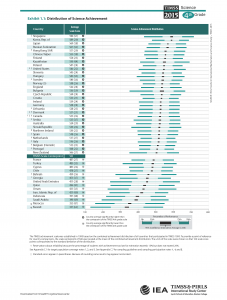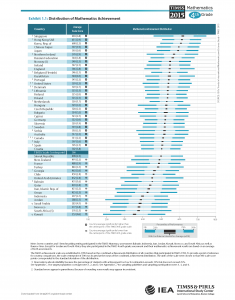
 Canadians should be concerned about mathematics and science education in our elementary schools, according to the latest release by Trends in International Mathematics and Science Study (TIMSS), a report on student achievement around the world.
Canadians should be concerned about mathematics and science education in our elementary schools, according to the latest release by Trends in International Mathematics and Science Study (TIMSS), a report on student achievement around the world.
Canada ranked 29th in Grade 4 math, well behind leaders Singapore, Hong Kong, Korea, Taiwan and Japan. The US ranked 14th. By the time our kids reach grade 8, our ranking moves up to 8th, still behind Singapore, Korea, Taiwan, Hong Kong, Japan, Russia and effectively tied with Kazakhstan (the US is marginally behind Canada).
In Grade 4 science, Canada ranks 23rd; the US ranks 10th. Grade 8 science shows Canada in 13th place, still two places behind the US.
Recent “investments” have been announced for universities [such as here, here, and here, among many, many more]. Each announcement includes the statement “Canada’s Innovation Agenda aims to make this country a global centre for innovation—one that creates jobs, drives growth across all industries and improves the lives of all Canadians. This investment exemplifies that vision in action.”
Under the heading of Global Science Excellence, the Innovation Agenda consultation asks “How do we make best use of our science and research strengths?”
Should we be concerned about the premise of the consultation? Do we first need to ensure that Canada has a sustainable science and research strength, before we ask how to make best use of it? Ranking 29th in Grade 4 math should trouble all Canadians concerned about our ability to lead in a global digital economy.
It is why I have been pushing so hard for programs like Internet for Good and Connected for Success to be available in all areas of the country. In today’s environment, kids need connected computers at home to succeed in school.
Canada’s Innovation Minister says “the digital economy is the economy“. He is right. In today’s economy, let’s make sure our elementary school kids can do their math without using their fingers.
